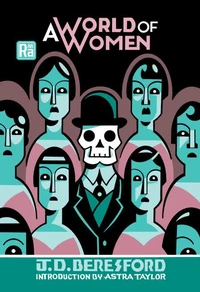In this pioneering science-fictional treatment of superhuman intelligence, a mutant wonder child's insights prove devastating. Science fiction luminary Ted Chiang introduces The Hampdenshire Wonder, one of the genre's first treatments of superhuman intelligence. Victor Stott is a large-headed "supernormal" mutated in the womb by his parents' desire to have a child born without habits. Known as "the Wonder, " Victor surveys humankind's science, philosophy, history, literature, religion-the best that has been thought and said-and dismisses it brutally: "So elementary . . .
inchoate . . . a disjunctive patchwork." Rejecting "the interposing and utterly false concepts of space and time, " the Wonder claims that life itself is merely "a disease of the ether." Unable to deal with the child's disenchanting insights, his adult interlocutors seek to silence him . . . perhaps permanently.
In this pioneering science-fictional treatment of superhuman intelligence, a mutant wonder child's insights prove devastating. Science fiction luminary Ted Chiang introduces The Hampdenshire Wonder, one of the genre's first treatments of superhuman intelligence. Victor Stott is a large-headed "supernormal" mutated in the womb by his parents' desire to have a child born without habits. Known as "the Wonder, " Victor surveys humankind's science, philosophy, history, literature, religion-the best that has been thought and said-and dismisses it brutally: "So elementary . . .
inchoate . . . a disjunctive patchwork." Rejecting "the interposing and utterly false concepts of space and time, " the Wonder claims that life itself is merely "a disease of the ether." Unable to deal with the child's disenchanting insights, his adult interlocutors seek to silence him . . . perhaps permanently.

 , qui est-ce ?
, qui est-ce ?